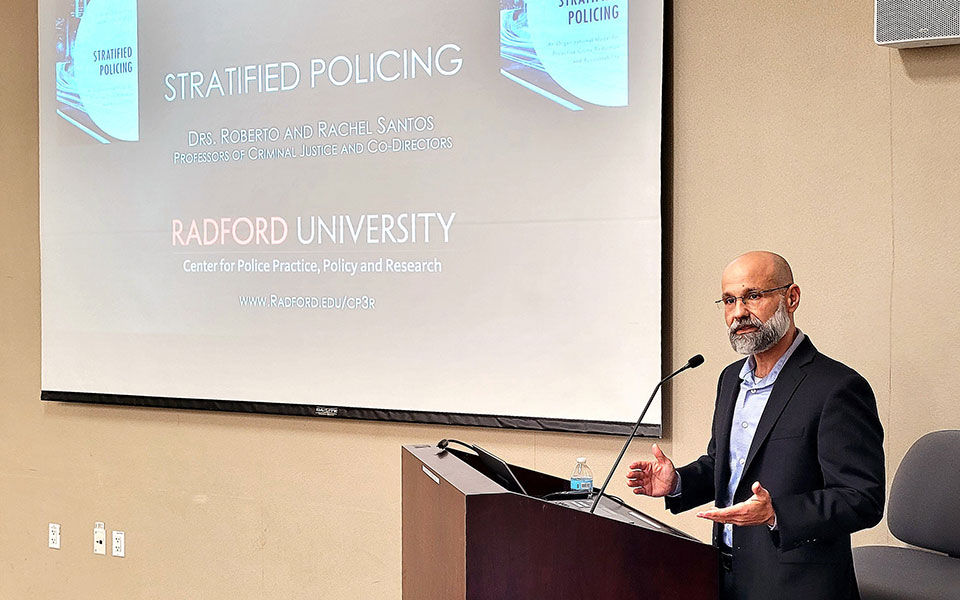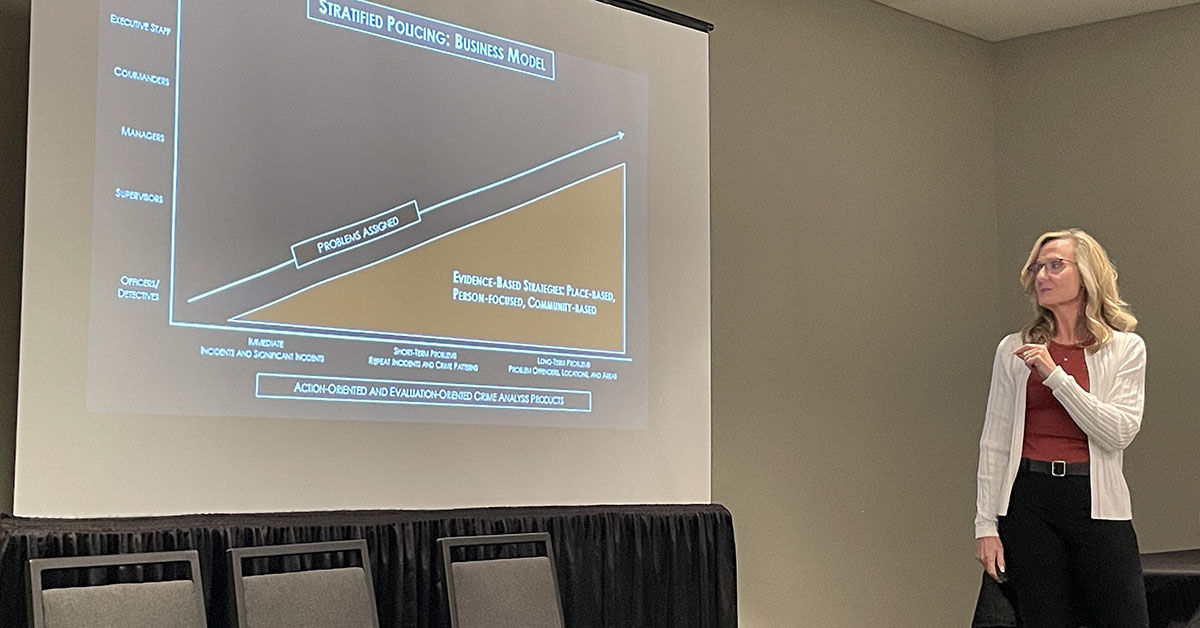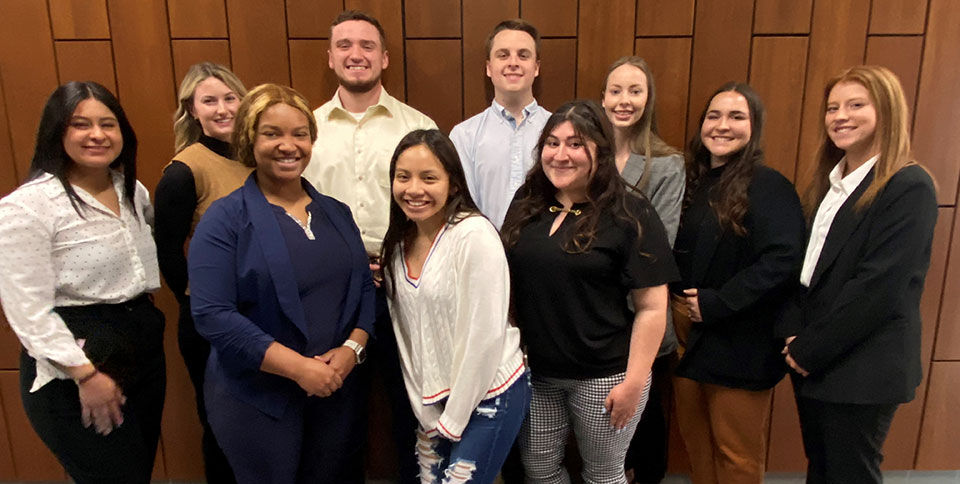Criminal justice professors build on groundbreaking research to further students’ careers
Roberto Santos, a long-time police practitioner-turned-academic, and Rachel Santos, a former crime analyst and established researcher, came to Radford in 2016 as new faculty members in the university’s Department of Criminal Justice. The Santoses had already established a reputation for successfully partnering with police agencies around the United States. Driving their success was a well-researched, evidenced-based business model for crime reduction.
“We know how police work, how they function day-to-day,” Roberto Santos explained, “and we’ve figured out ways to incorporate certain actions that have been proven to reduce crime in a very realistic, systematic way.”
Rachel Santos emphasized, “The ultimate goal in reducing crime is reducing victimization of people in the community. To understand how crime and victimization concentrate, we use crime analysis to focus on areas to work with the community and help make their day-to-day lives safer.”
Their model works, and the Santoses have the numbers and the testimonies to prove it.
Just ask Danville Police Chief Scott Booth.

Roberto Santos, Associate Professor of Criminal Justice and Co-director of Radford University’s Center for Police Practice, Policy and Research.
“Working with Roberto and Rachel, we crafted a model of stratified policing that works specifically for my department,” Booth said. “We have experienced substantial reductions in crime and continue to do so while having a community that supports our efforts. If you want a blueprint for effectively integrating evidence-based practices in your agency, this is it.”
Looking over Danville’s crime statistics today compared with 2016, “You’ll see it is remarkable what they have done there,” Roberto Santos said of the Danville Police Department. “Through his leadership, Chief Booth was able to transform his police department and develop strong partnerships with the community, city officials and other criminal justice agencies that resulted in community members experiencing consistently less victimization.”
*****
Roberto Santos retired after 22 years with the Port St. Lucie, Florida, Police Department, where he held various supervisory positions that included commander over criminal investigations, special investigations and professional standards divisions, as well as the crime analysis and criminal intelligence section. Along the way, the Marine Corps veteran earned a doctorate of philosophy in criminal justice.
Rachel Santos ignited her career while still in graduate school, working for five years as a crime analyst for the Tempe, Arizona, Police Department. She later served as senior research associate and director of the Crime Mapping Laboratory at the National Policing Institute in Washington, D.C. There, she honed her practice-based research skills working on national and international grants and projects.

Rachel Santos, Professor of Criminal Justice and Co-director of Radford University’s Center for Police Practice, Policy and Research.
The Santoses met in Florida, and since, “We have done a lot of original research together,” Roberto Santos said. "We’ve conducted quasi-experiments and random controlled trials to test different types of crime-prevention strategies and strategies that reduce victimization in a systematic way.”
The model the Santoses built from research and practice is called stratified policing. “It provides police leaders a clear path for institutionalization of crime reduction modeled after current police processes,” the Santoses wrote in their book “Stratified Policing: An Organizational Model for Proactive Crime Reduction and Accountability.”
“It sets up an organization to more easily incorporate evidence-based strategies into everyday operations with the goal of changing a police organization from reactive to proactive.”
Stratified policing employs four categories of crime reduction strategies, Roberto Santos explained. “It’s place-based, person-focused, community-based and infuses a problem-solving approach,” he said.
In their book, the Santoses write that the model’s framework infuses small changes within the daily activities of police agencies and builds a comprehensive and focused approach to crime reduction. They lay out methods for developing crime reduction goals and addressing immediate, short-term, and long-term crime and disorder problems while implementing a stratified accountability meeting structure.
“Research shows that only responding to calls and investigating individual crimes does not reduce crime overall in a community,” Rachel Santos said. “That’s why we have figured out a business model for an agency-wide approach, and we’ve been very successful. Danville and Lynchburg are just two recent agencies that we’ve been working with in Virginia.”
Most recently, the Santoses have worked with law enforcement agencies along the East Coast – Maryland, Virginia, North Carolina, Georgia, Florida and Delaware; in the Midwest – Ohio and Wisconsin; and farther west into Texas, Utah, Nevada, Colorado and California.
That work and their research led them to create the Center for Police Practice, Policy and Research on campus, and soon thereafter, they established a crime analysis and criminal intelligence minor within the Department of Criminal Justice. It is designed to help Radford students build a foundation of knowledge and skills that is already translating to careers as law enforcement crime and intelligence analysts.
*****
James Denfeld graduated cum laude from Radford University in May 2023, and three months later, he secured a job as a civilian crime analyst with the Danville Police Department.
Completing the crime analysis and criminal intelligence minor, Denfeld said, “was one of the best decisions I ever made while at Radford because it has similarities between the work we did in class and the work I will be doing as an actual crime analyst.”
When Denfeld interviewed for the position in Danville, he shared his portfolio, which contained about 80 pages of project material he had created over two years in the minor.
“They loved it,” Denfeld said. “That work played a massive role in securing the position within the department, along with a very kind recommendation from Dr. [Roberto and Rachel] Santos, who have worked with the department over the years.”

Pictured are 2023 Crime Analysis and Criminal Intelligence minor graduates and Crime Analysis graduate certificate students
Helping graduates find jobs straight out of Radford is “one our biggest goals,” Roberto Santos said. “We want to get them into a good professional organization, making good money with great benefits.”
Those law enforcement agency connections the Santoses have established over the years while working to employ stratified policing pays great dividends to Radford graduates.
“We’re not done with our students once they graduate,” Rachel Santos said. “We are on the phone a lot to make connections and be references for them, helping our graduates get jobs with police organizations.”
Alumni now have crime analysis jobs, Rachel Santos explained, in Virginia, Arizona, Nevada, Texas, Florida, North Carolina and South Carolina.
That’s where one 2022 graduate, Skylar Rife, works. Her story about completing the crime analysis and criminal intelligence minor is similar to the one Denfeld tells.
“It’s very hands-on, and you work on projects with real data,” explained Rife, who is a crime analyst with the Greer (South Carolina) Police Department. “As you progress in the minor, you come to know and understand more about the different types of crime analysis, the purpose of each and how they fit directly into the law enforcement world.”
Once she completed the minor, Rife was “well equipped,” she said, to begin a career as a crime analyst.
Imparting knowledge to students that will help them later, as graduates, find jobs that ultimately will lead to safer communities is the reason Rachel and Roberto Santos created the crime analysis and criminal intelligence minor four years ago.
“When agencies hire an analyst, they do so because they want less victimization in their communities,” Rachel Santos said. “When one of our graduates says to a police agency that they have been trained in stratified policing and show examples of the crime analysis and intelligence techniques that will help the agency reach their goals of decreasing victimization, that is exactly what agencies want to hear and see.”